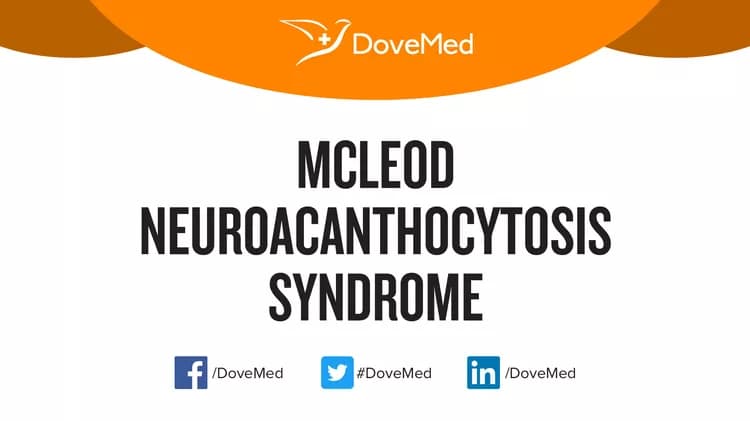What are the other Names for this Condition? (Also known as/Synonyms)
- McLeod Syndrome
- X-linked McLeod Syndrome
What is Mcleod Neuroacanthocytosis Syndrome? (Definition/Background Information)
- McLeod Neuroacanthocytosis Syndrome is primarily a neurological disorder that occurs almost exclusively in males. Only about 150 cases have been reported worldwide. This condition affects movement in many parts of the body
- People with this condition also have abnormal star-shaped red blood cells (acanthocytosis)
- This condition is one of a group of disorders called neuroacanthocytoses that involve neurological problems and abnormal red blood cells
- McLeod Neuroacanthocytosis Syndrome is inherited in an X-linked recessive fashion and is caused by mutations in the XK gene
(Source: Mcleod Neuroacanthocytosis Syndrome; Orphanet, National Institute of Health and Medical Research (INSERM), Paris.)
Who gets Mcleod Neuroacanthocytosis Syndrome? (Age and Sex Distribution)
- McLeod Neuroacanthocytosis Syndrome is a rare inherited disorder, reported in a few hundred individuals in the scientific literature
- The onset of disease symptoms typically occurs in mid-adulthood
- The condition predominantly affects males
- Worldwide, individuals of all races and ethnicities may be affected
What are the Risk Factors for Mcleod Neuroacanthocytosis Syndrome? (Predisposing Factors)
- A positive family history may be an important risk factor, since Mcleod Neuroacanthocytosis Syndrome can be inherited
- Currently, no other risk factors have been clearly identified for the syndrome
It is important to note that having a risk factor does not mean that one will get the condition. A risk factor increases one’s chances of getting a condition compared to an individual without the risk factors. Some risk factors are more important than others.
Also, not having a risk factor does not mean that an individual will not get the condition. It is always important to discuss the effect of risk factors with your healthcare provider.
What are the Causes of Mcleod Neuroacanthocytosis Syndrome? (Etiology)
Mcleod Neuroacanthocytosis Syndrome is caused by mutation(s) in the XK gene.
- This gene codes for the XK protein, an erythrocyte antigen. A mutation or deletion in this gene causes a modified XK protein with a dysfunctional Kell protein binding site
- The Kell antigen system helps determine blood types and are also targets of diseases that destroy blood cells
- The condition is inherited in an X-linked recessive manner
X-linked recessive inheritance pattern: The gene associated with this condition is located on the X chromosome, which is one of the two sex chromosomes. In males (who have only one X chromosome), one altered copy of the gene in each cell is sufficient to cause the condition. In females (who have two X chromosomes), a mutation would have to occur in both copies of the gene to cause the disorder. Because it is unlikely that females will have two altered copies of this gene, males are affected by X-linked recessive disorders much more frequently than females. A characteristic of X-linked inheritance is that fathers cannot pass X-linked traits to their sons.
What are the Signs and Symptoms of Mcleod Neuroacanthocytosis Syndrome?
The signs and symptoms of Mcleod Neuroacanthocytosis Syndrome may include:
- Weak muscles
- Involuntary twitching or jerking of arms and legs
- Reduced sensation and weakness limbs
- Involuntary muscle tensing, leading to muscle
- Facial tics
- Making noises such as clicking, involuntarily
- Cognitive impairment
- Cardiomyopathy
- Seizures
- Changes in personality
- Changes in behavior
How is Mcleod Neuroacanthocytosis Syndrome Diagnosed?
Mcleod Neuroacanthocytosis Syndrome is diagnosed on the basis of the following information:
- Complete physical examination
- Thorough medical history evaluation
- Assessment of signs and symptoms
- Laboratory tests, including checking for levels of Kell antigens
- Imaging studies
- Biopsy studies, if necessary
- Molecular genetic testing to check for or confirm causative gene mutation(s)
Many clinical conditions may have similar signs and symptoms. Your healthcare provider may perform additional tests to rule out other clinical conditions to arrive at a definitive diagnosis.
What are the possible Complications of Mcleod Neuroacanthocytosis Syndrome?
The complications of Mcleod Neuroacanthocytosis Syndrome may include:
- Risk of falls and injury, if seizures are present
- Social isolation, depression
- Progressive muscle weakness
- Arrhythmias, that can lead to heart attack
- Aspiration pneumonia
- Systemic infection
Complications may occur with or without treatment, and in some cases, due to treatment also.
How is Mcleod Neuroacanthocytosis Syndrome Treated?
There is no cure for Mcleod Neuroacanthocytosis Syndrome, since it is a genetic condition. The treatment is usually given to manage the signs and symptoms and any complication that develops. The following treatment methods may be employed:
- Medication to control seizures
- Medication to reduce involuntary muscle movements (Example: dopamine blocking medications)
- Botulinum toxin injections to improve muscle function
- Physical therapy to improve muscle strength
- Occupational and speech therapy, if necessary
How can Mcleod Neuroacanthocytosis Syndrome be Prevented?
Mcleod Neuroacanthocytosis Syndrome may not be preventable, since it is a genetic disorder.
- Genetic testing of the expecting parents (and related family members) and prenatal diagnosis (molecular testing of the fetus during pregnancy) may help in understanding the risks better during pregnancy
- If there is a family history of the condition, then genetic counseling will help assess risks, before planning for a child
- Active research is currently being performed to explore the possibilities for treatment and prevention of inherited and acquired genetic disorders
Regular medical screening at periodic intervals with tests and physical examinations are recommended.
What is the Prognosis of Mcleod Neuroacanthocytosis Syndrome? (Outcomes/Resolutions)
- The prognosis of Mcleod Neuroacanthocytosis Syndrome is poor, owing to the progressive nature of the disorder
- Affected individuals may succumb to seizures, heart attack, aspiration pneumonia or systemic infections
Additional and Relevant Useful Information for Mcleod Neuroacanthocytosis Syndrome:
The following DoveMed website link is a useful resource for additional information:
Related Articles
Test Your Knowledge
Asked by users
Related Centers
Related Specialties
Related Physicians
Related Procedures
Related Resources
Join DoveHubs
and connect with fellow professionals


0 Comments
Please log in to post a comment.